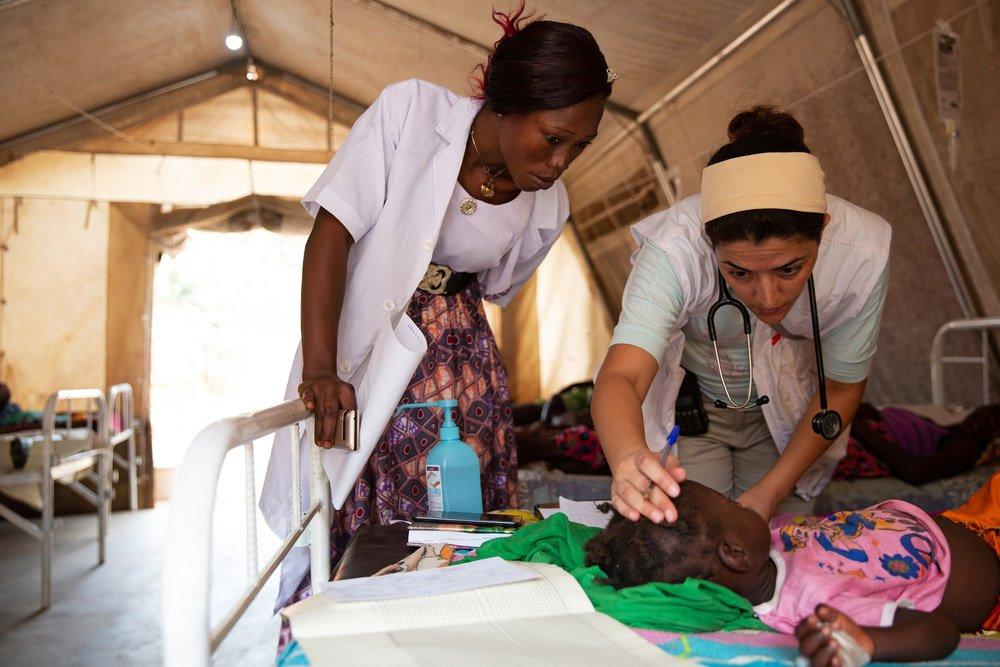When the first cases of COVID-19 pandemic were confirmed in the Central African Republic in March, the country was already in the throes of a major humanitarian and health emergency. Earlier this year, CAR declared a nationwide measles epidemic, the biggest outbreak in almost two decades. Doctors Without Borders is treating and vaccinating children on a large scale in several areas around the country.
Ndongue Measles Crisis
Ndongue is an isolated village in western Central African Republic, close to the border with Cameroon. Scores of parents and young children are lining up at a vaccination post that Doctors Without Borders has set up under a large mango tree in the centre of the village. The team is here to administer measles and pneumonia (PCV13) vaccination.
Some of the children waiting for their turn have stripes made out of mango bark and leaves on their faces, a traditional remedy for measles and other ailments. For most people living in this remote area, traditional medicine is the only option if they get sick.
¨Nobody here can afford to pay for a hospital, so we try to cure ourselves using traditional medicine. As a last resort we go to traditional healers, and pay them with a chicken if we have no money, ¨ says Véronique, a local farmer who has come to get the youngest of her six children vaccinated, three-months-old Sarah André. “This is the first time we have heard about a vaccination.¨
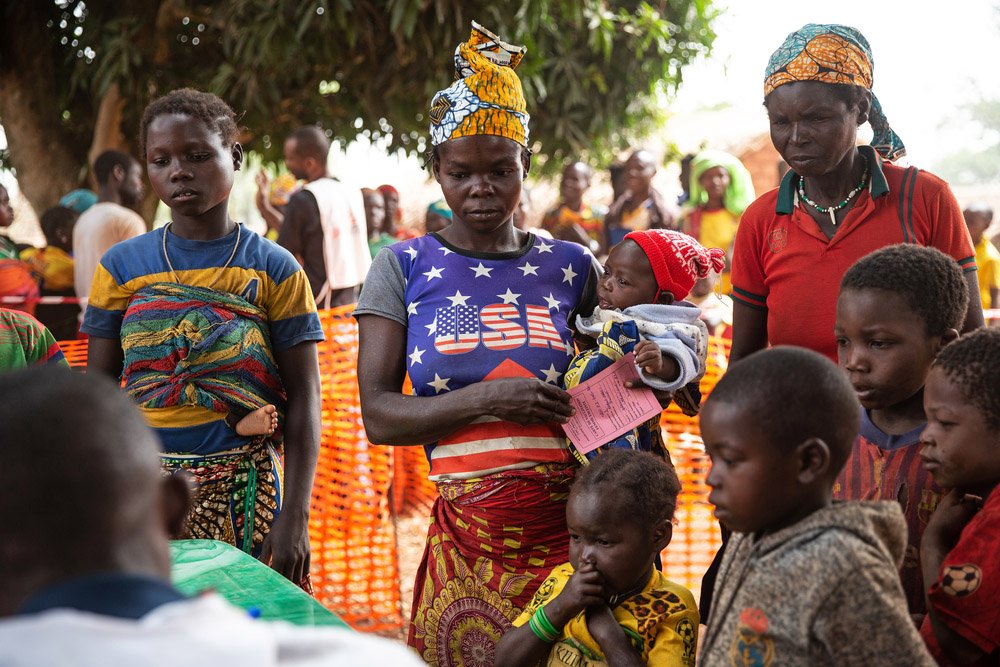
After many years of violence and insecurity, the Central African Republic is in a state of a chronic health emergency. Many of the country´s five million inhabitants, more than 700,000 of them internally displaced due to insecurity, don´t have access to healthcare, and many children have not been vaccinated.
In these conditions, a preventable but highly contagious disease like measles can spread fast. In January, the Ministry of Health declared a nationwide measles epidemic.
Launching Vaccinations in CAR
In support of the health authorities, Our teams have launched a massive vaccination campaign to vaccinate more than 340,000 children for measles in seven health zones across the country. ¨The logistical challenges and costs of setting up a large-scale vaccination campaign in such remote, isolated parts of the country are enormous,” says Ester Gutierrez, MSF´s head of mission in CAR. ¨Many of these areas can only be reached by plane. Our mobile teams often spend several days in the field, to reach the most far-flung villages. Insecurity is another issue. In the area between Bria and Ouadda in the centre of the country, for instance, clashes prevented us from carrying out our planned medical and vaccination activities.”
Keeping vaccines cold in areas without reliable electricity is a huge challenge. Zacharie Musangu is a veteran MSF staff who first started working with the organization in his native Democratic Republic of Congo in 2004. At MSF´s temporary base in the small town of Baboua, close to the border with Cameroon, the logistics expert gets up every morning at 3 am to prepare vaccines for the eight mobile teams that take them by car or motorbike to remote villages in the district. ¨The most important part is to maintain the same temperature when vaccines are taken from the freezers at our base, what we call the active cold chain, to the passive cold chain in cooler boxes that our mobile teams are taking to the vaccination sites. It´s a very delicate procedure, ¨ says Zacharie, who everyone calls Papa Zac. Parallel to the vaccination campaign, our teams also treat children already sick with measles. Since the beginning of 2020, more than 6200 suspected cases of measles have been notified and treated by MSF in Ouham region and Nangha Boguila and Bossangoa health districts in the north of the country.
Measles in the Democratic Republic of Congo
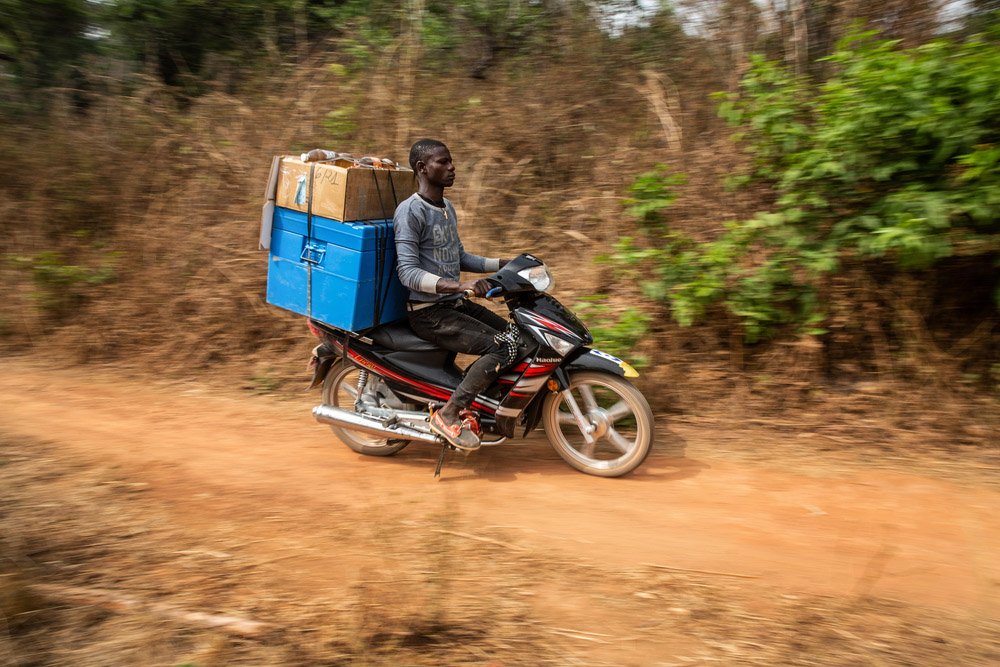
Affected by measles: Maxime and Hammadou
Yvonne Zongagofo has brought her stepson Maxime to a health post that we support in the village of Benzambe, several hours drive from the town of Bossangoa. Maxime has been sick for three days. He has a fever and doesn´t want to eat. “I have insisted with my family to take Maxime to the health post - I knew it was measles¨, she says. ´We haven’t had anybody get sick from this disease for years, but I recognized the symptoms because I remember the last epidemic when I was a child. Back then, traditional medicine was the only remedy, and there were no NGOs, doctors or hospitals in this region. Nowadays the situation has improved slightly, we have a bit more access to healthcare, but it’s not enough. Children are still dying in my community.” After the consultation at the health post, Maxime is taken to the MSF-supported hospital in Bossangoa, where a special measles ward has been set up.
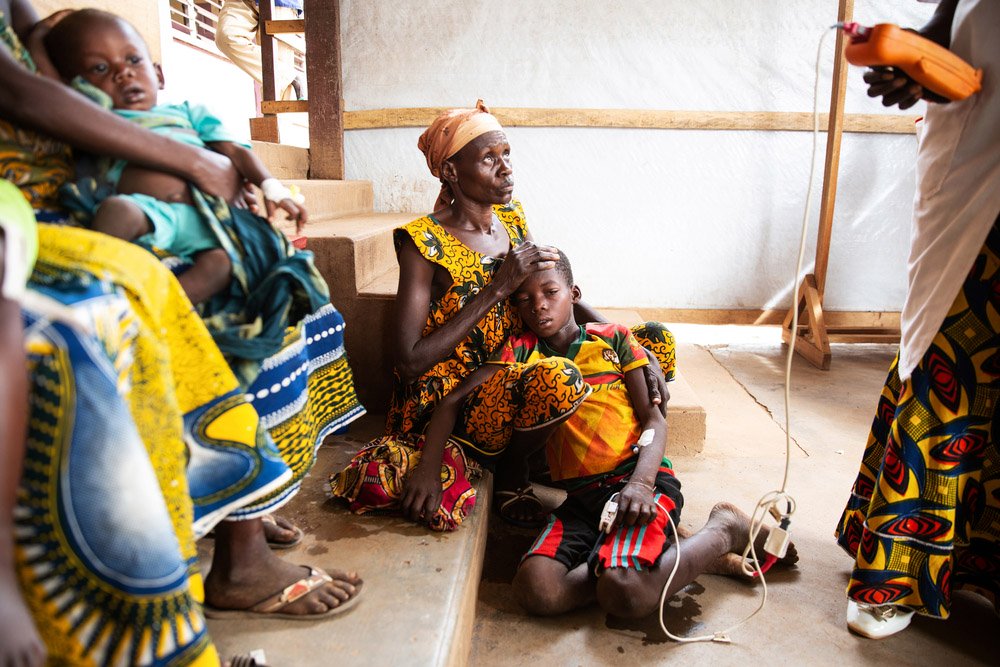
Children whose immune system is weakened by measles often develop a range of other health issues, including severe respiratory infections such as pneumonia, or diarrhoea. Another frequent complication is malnutrition. Many children with measles develop painful ulcers that can prevent them from eating properly. Sick children don´t have a lot of reserves and get malnourished quickly. Our teams treat those comorbidities as well as stand-alone diseases like measles or malaria that remain the main killers for children in CAR.
30-year old Soulaimani Bouldi is a trader from the village of Besson, where an MSF mobile team had carried out a vaccination campaign a few days earlier. Soulaimani had brought his two-year-old son Hammadou to get vaccinated, but our medical team diagnosed malnutrition in the little boy, who had previously been sick with measles, and referred him to Baboua hospital, where MSF is temporarily supporting the pediatric ward and set up three tents to treat measles cases with complications. ¨Our life has been incredibly hard the past few years¨, says Soulaimani. ¨Five years ago we had to flee to Cameroon because of attacks of armed groups. When we came back, our house was destroyed and our animals were stolen. We don´t have any money to pay for medicines for our children.¨
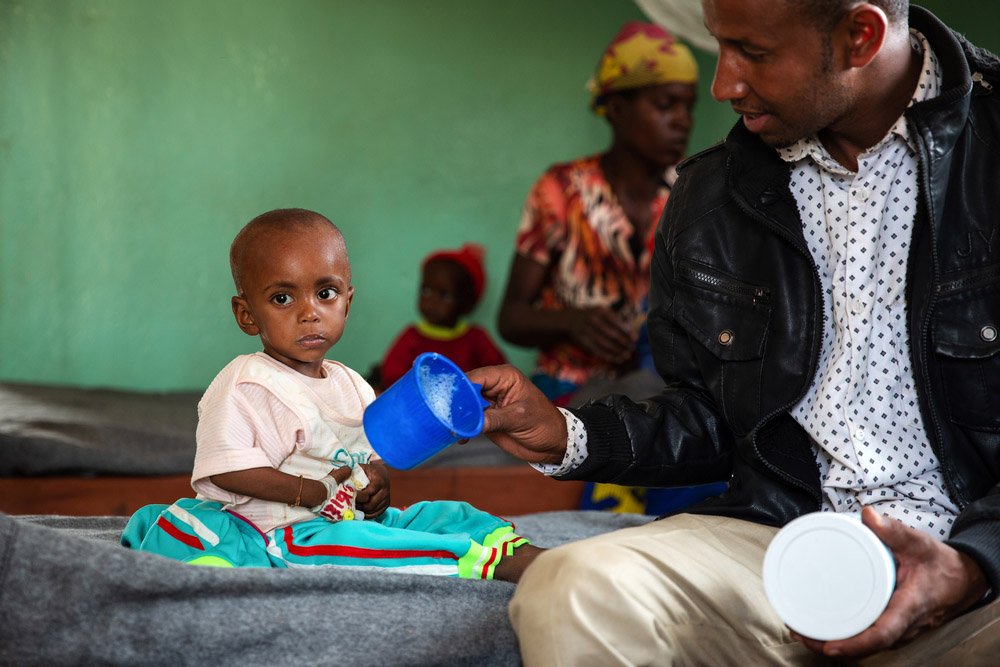
Sadly, for some children and their families help comes too late. A woman called Zari Odette brings her baby to Baboua hospital, but the little boy is dead on arrival. He had recently been ill with measles and most likely died of respiratory complications. In 2018 alone, measles claimed the lives of more than 140,000 people around the world, most of them young children, and the numbers for last and this year are expected to be far higher, with devastating large outbreaks in several countries.
¨Children should not have to die of a preventable disease like measles¨, says Adelaide Ouabo, MSF medical coordinator. ¨Unlike for the new Coronavirus, we´ve had a vaccine for measles for decades, and we need to make sure that as many children as possible have access to it.¨The first COVID-19 case was confirmed in CAR in March, and MSF is supporting the response of the health authorities to the pandemic. ¨At the same time, our priority remains to continue our life-saving medical projects in many areas of the country¨, says Ouabo. ¨We need to make sure that COVID-19 containment measures do not jeopardize the battle against silent killers such as measles, malaria, pneumonia or malnutrition. We know from experience that reduced access to medical services in times of emergencies leads to even more health crises.”
Our main concern is that reduced access to vaccinations could create dangerous immunity gaps that will lead to a rise in vaccine-preventable diseases in the coming months.
